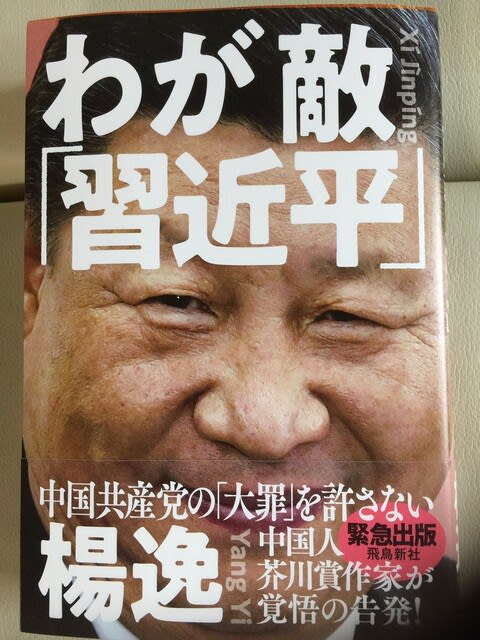The following is from the much-talked-about book by Yang Yi, the first Chinese author to win the Akutagawa Prize and now a naturalized citizen of Japan.
This book is a must-read, not only for Japanese citizens but also for people worldwide.
This chapter, in particular, is a must-read for all Japanese citizens.
I subscribed to it on the recommendation of one of the leading readers.
People have not yet done so; please subscribe tomorrow at your local bookstore, etc.
Very concise, very easy to read, and will eventually earn the reputation of a historical classic.
P156
BLUE - a tactic to get people on your side through expediency
For example, in the case of B, if you are a researcher of Chinese history, if you disobey the authorities' intentions, you will not enter China, and your activities will be impossible.
However, if you understand their intentions, various accommodations will be offered to you, and it will be surprisingly easy for you to do your work.
That's why all China-related researchers are pro-China.
The same is right for media personnel.
Most of the major Japanese media are pro-China.
The same goes for other friendship associations and non-profit organizations with ties to China.
One book that has been banned in China is Qinglian's "The Pitfalls of Chinese Modernization: China on the Crater" (Soshisha).
In one passage, he writes: "Some scholars of China, especially Chinese scholars, have found that if they admire China, they are favored by the government and can go into China to conduct research and obtain material from the departments involved.
(Omitted)
If foreign scholars study based on these resources, no matter how much of a gap there is between that and reality, the Chinese government has adopted it and".
Qinglian also talks about "the falsification of statistical figures, which has become a common practice of the Chinese government," saying that "scholars who have their own interests at heart cannot be bothered with falsification, and would instead use the falsified figures to achieve the results the government expects.
And if anyone is enjoying the BLUE, it is WHO Director-General Tedros.
Since the outbreak of the new coronavirus, Chinese authorities have stubbornly refused to allow the US CDC and other international investigative teams to be sent to the country to investigate, while at the same time pulling out all the stops to cover up the information.
The biggest "helper" is, of course, WHO Director-General Tedros.
And when world-renowned virologists have refused to talk about the source of the virus or the Wuhan P4 laboratory when asked to discuss it. Some have deliberately diverted, others had written a paper to verify it and then withdrew it just before publication," Joshua, an investigative reporter for the Epoch Times said in the documentary film "Communist Party, Solving the Mystery of the Origin of the New Coronavirus."
Nevertheless, the truth came out, and soon it could no longer be hidden that the virus came from the Wuhan P4 laboratory.
At such a delicate time, French scientist Luc Montagnier, who was awarded the Nobel Prize in Physiology or Medicine in 2008, was interviewed by the French medical news website Pourquoi Docteur on April 16, 2020; he said that the virus was synthesized artificially in the Wuhan laboratory.
It seemed like a "bombshell" at first glance, but then he went on to say that it was leaked in an accident, that it was not a biological weapon), and that the virus was created to develop an HIV vaccine.
China is a big country, so it's not surprising that mistakes were made," as if "the Chinese authorities are innocent and not responsible," or "the Wuhan laboratory is working hard to develop an AIDS vaccine. Still, the virus escaped from the lab on its own," he said, seemingly in China's defense.
A quick Wikipedia search of the man reveals that he is an expert in AIDS research and has received numerous awards worldwide.
Including the Nobel Prize and the Lasker Prize in Medicine, the Schöhle Prize, the Gardner Prize, the King Faisal Prize in Medicine, the Heineken Prize in Medicine, the Prince of Asturias Prize in Medicine, and Japan's "International Prize."
What is most disturbing is that in the interview, he said, "I was in China for a few weeks just before the new coronavirus broke out in Wuhan.
Why? I'm tempted to ask him.
I found out that he became a full professor at Shanghai Jiaotong University after winning the Nobel Prize in 2008, and in 2018 he also became an honorary professor at the Chinese Institute of Foshan Science and Technology, where he also founded the Luc Montagnier Laboratory.
As good as Tedros is, it seems to be a classic case of BLUE.
This article continues.










